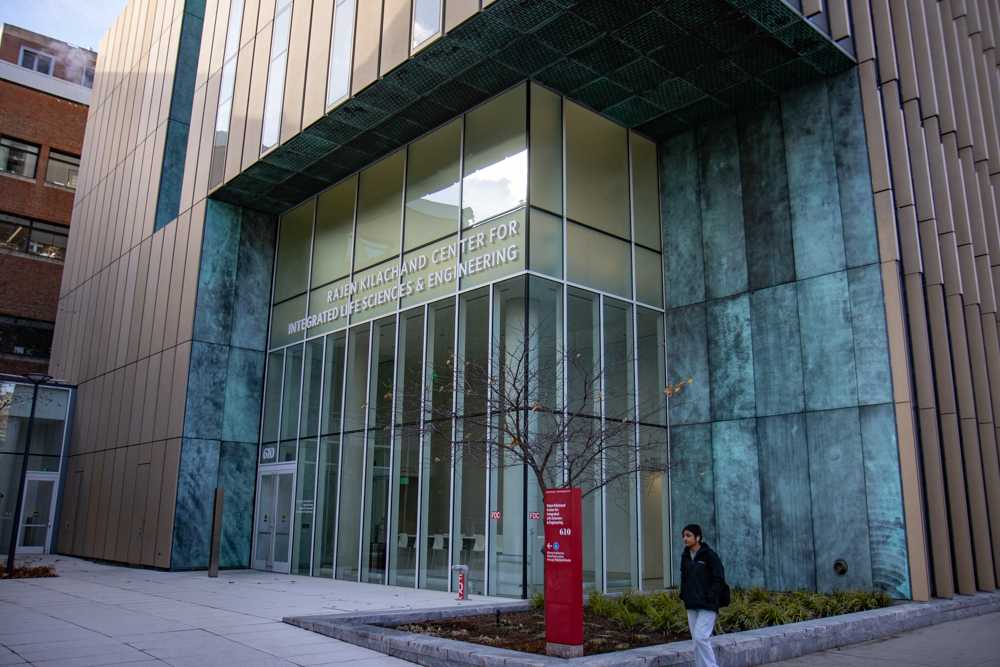Even with one foot out the door, President George W. Bush assured the American people that he is still a man who acts from his heart.
‘I have followed my conscience and done what I thought was right,’ he said in his farewell address last Thursday. ‘You may not agree with some of the tough decisions I have made, but I hope you can agree that I was willing to make the tough decisions.’
When it comes to science policy decisions, reason and the truth must always play a part. Science is a discipline that often presents more than meets the eye and defies gut instincts.
With Barack Obama stepping into the presidency today, many of the scientific challenges presented to Bush eight years ago remain unresolved and in need of work by the new administration.
STEM CELL RESEARCH
One of the first actions Bush took upon entering the White House in 2001 was to pass restrictions on the funding of stem cell research from any new batches.
Stem cell researchers are now limited to the batches available in August 2001 but believe further research has the potential to yield great improvements in health that are otherwise unavailable right now.
Primary advances would include new cellular therapies for diseases such as juvenile diabetes and Parkinson’s disease, new insights into the origins of inherited diseases and the ability to test new drugs on human cells growing in labs rather than through human trial, according to Sean J. Morrison, a University of Michigan Professor in Medicine Director, Center for Stem Cell Biology.
Stem cell research requires the destruction of days-old embryos, a practice to which pro-life advocates object. Bush has touted the benefits of adult stem cells and other types that do not require the destruction of human embryos.
In 2005, legislation to loosen restrictions on federal funding for stem cell research passed the House of Representatives and the Senate. The bill would allow funding for stem cells derived from the destruction of human embryos.
At the time, Senate Majority Leader Bill Frist (R-TN), a practicing surgeon and abortion opponent, reversed his stance and urged for the passage of the bill.
‘It’s not just a matter of faith, it’s a matter of science,’ Frist said.
It took George W. Bush an entire term and a half before he used a presidential veto. That first veto, in July 2006, nullified the passing of the Stem Cell Research Enhancement Act.
Similar legislation, under the same name, passed the House and the Senate in 2007 only to be defeated again by a Bush veto.
‘Destroying human life in the hopes of saving human life is not ethical ‘- and it is not the only option before us,’ Bush said in 2007.
‘There are some 400,000 leftover, unwanted embryos in fertility clinics across America,’ Senator Tom Harkin (D-IA), the bill’s chief sponsor, said. ‘All we are saying is, instead of throwing those leftover embryos away, let’s allow couples to donate a few of them, if they wish, to create stem cell lines that could cure diseases and save lives.’
THE HOT TOPIC OF THE ENVIRONMENT
Since the 2005 release of the Oscar-winning documentary, An Inconvenient Truth, former Vice President Al Gore has become the face of the fight against global warming. After losing the 2000 election to Bush, Gore focused on getting the word out about the threat of manmade climate change to politicians and the public.
Bush and Vice President Dick Cheney never showed the same fervor for environmental matters during the last eight years. Both worked in the energy industry before the 2000 campaign and depended on the donations of oil executives for their campaigns.
As scientific consensus increasingly supported the idea that the burning of fossil fuels was leading to increased levels of atmospheric CO2 and global warming, Bush insisted on three conditions to any remedy to climate change. His positions was that a solution must not hurt the US economy, must hold poorer countries like India and China accountable and should be led by new technologies rather than sacrificing the use of current ones.
Although the Senate unanimously rejected the Kyoto Protocol, a worldwide treaty to reduce greenhouse gas emissions, shortly before Bush took office, the United States remains the only country other than Kazakhstan that has yet to ratify the treaty.
Last August, Bush proposed a restriction on emissions for the first time. He called for the end of growth of US emissions by 2025. But supporters of drastic measures said that goal was far short of what the US needs to do. The Kyoto Protocol calls for decreases from 1990 levels of emissions.
THE CONTROVERYSY OF EVOLUTION
Bush received praised from his base and endured criticism from many others regarading remarks he made in 2005 about teaching evolution in schools. The president seemed to cast doubt on the validity of evolution by advocating the teaching of other theories alongside evolution. The Supreme Court has ruled that teaching creationism along side evolution in public schools is unconstitutional.
‘Both sides ought to be properly taught . . . so people can understand what the debate is about,’ Bush said in an August 2005 press conference. ‘Part of education is to expose people to different schools of thought. . . . You’re asking me whether or not people ought to be exposed to different ideas, and the answer is yes.’
‘If schools want to teach about the controversy over evolution they should do it in classes on religion, philosophy or social problems,’ said Al Teich, the director of science and policy programs at the American Association for the Advancement of Science.
‘Teaching the controversy’ is an example of how the Bush administration used science as a cynical talking point, said Jim Gomes, director of the Mosakowski Institute of Public Enterprise at Clark University.
‘It’s a way of justifying not doing what the side that seems to have the stronger argument says whether it’s evolution or global warming is real or stem cell research might provide benefits,’ Gomes said.
INTO THE FINAL FRONTIER
In January 2004, Bush announced the Vision for Space Exploration, in which he outlined the long-term plans for US space policy, including the development of a new vehicle, the Orion spacecraft, to send humans back to the moon by 2020.
Bush’s plans came after the investigation of the space shuttle Columbia disaster. The investigation report concluded that if human life will continue to be risked through space exploration, it had to be for bigger stakes than low-Earth orbit, the extent of exploration since the Apollo program ended 34 years ago.
The passage of the NASA Authorization Act of 2005 established the Constellation program, formally launching the plans of the Vision. Constellation also includes the development of the Ares I and Ares V boosters and the Altair lunar vehicle, so that humans can gain experience in deep space travel for possible future trips to Mars.
Constellation has moved forward with few set backs, said Scott Pace, director of the Space Policy Institute at George Washington University. The Bush administration has had to shave some funding from the original projections due to setbacks such as Hurricane Katrina and the economic downturn, which has slowed down the schedule, he said.
Some critics of Constellation point to the gap between the 2010 retiring of the Space Shuttle and the first manned flight of Orion in 2014. The plan is to fly astronauts on the spacecrafts of International Space Station partners during this gap.
AN EPIDEMIC OF POLITICAL INTERFERENCE
Most past administrations have cherry picked scientific data to further their agendas, but the Bush administration crossed the line in terms of how often it used this as a tactic to get what it wanted, said Timothy Donaghy, an analyst with the Cambridge-based Union of Concerned Scientists’ scientific integrity program.
The Union of Concerned Scientists compiles examples of political interference in science from the best way to protect endangered species to the Food and Drug Administration, ignoring warnings about the prescription drug Vioxx.
In one high profile case, NASA’s top climate scientist, Dr. James E. Hansen, called on the US to reduce greenhouse gas emissions in a December 2005 lecture. Soon after, NASA officials began filtering the public statements and press releases from its scientists since capping emissions was in opposition to the Bush administration’s global warming stance. At one point, NASA refused to allow Hansen to appear on National Public Radio for an interview.
In a democracy, policy is based on many considerations and only one of those is science, said Teich at AAAS.
‘Problems arise, however, when science is systematically ignored, and scientific findings that should be involved in a decision are suppressed or twisted to fit the preferences of the decision-makers,’ Teich said.
Good scientists are not going to want to work for the federal government if they don’t think they’re expertise is being respected, Donaghy said. The worry is that there could be brain drain if interference continues, he said.
Critics said that President Bush has valued ideology over science in creating policy, often to serve the interests of his constituents like the religious right and oil companies.
‘One cannot underestimate the extent to which the elevation of ideology over science has a corrosive effect on American innovation and economic competitiveness,’ University of Michigan biology professor Sean J. Morrison said. ‘These ideas and values cannot survive in an environment in which policy and resource allocation are not data driven.’
‘Our basic point is that this is hugely inappropriate for science and also hugely inappropriate for the basic functioning of democracy,’ Donaghy said.
























































































































